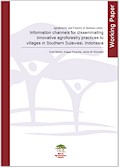| Working Paper Series |
 |
|
| Title | Agroforestry and Forestry in Sulawesi series: Information channels for disseminating innovative agroforestry practices to villages in Southern Sulawesi, Indonesia | | Author | Endri Martini, Enggar Paramita and James M Roshetko | | Year | 2016 | | Publisher | World Agroforestry Centre (ICRAF) Southeast Asia Regional Program | | City of Publication | Bogor, Indonesia | | Series Number | Working Paper 224 | | Number of Pages | 24 | | Call Number | WP0196-16 | | Keywords | Opinion leaders, extension agents, South Sulawesi, Southeast Sulawesi, mass media,
interpersonal |
|
| Abstract: |
| This study was conducted to identify potential information channels for disseminating
agroforestry innovations at village level in South and Southeast Sulawesi provinces,
Indonesia. An information channel is a method of transmitting information in a specific, oneway
flow. In this study, an investigation of information channels from sources to users was
conducted to understand the dissemination of innovative agroforestry practices. A better
understanding of how farmers obtain information will enhance the impacts of any agricultural
extension program. The study was conducted through semi-structured interviews with 144
farmers (40% female) from 12 villages in two districts in South Sulawesi Province and two
districts in Southeast Sulawesi Province. In each village, 12 respondents from various
ethnicities were interviewed. Data collected during the study covered sources of information,
type of information channel in disseminating agricultural/agroforestry information, and
important disseminators. Results from the study identified four types of information channels,
that is, 1) mass media; 2) personal contacts (interpersonal communication) through opinion
leaders, extension agents and other reliable contacts, such as family and friends; 3) formal
extension services or government programs; and 4) social gatherings, such as weddings and
village meetings. Personal contacts (interpersonal communication) were considered the most
accessible for farmers. We also found that opinion leaders (who were also expert farmers) and
government extension agents were the two major actors for disseminating agroforestry
innovations. Interpersonal discussion with the agroforestry disseminators was the most
preferred information channel. Formal extension services were considered as the most reliable
channel for disseminating agroforestry innovations, however, the services were limited and
mostly occurred only in areas with better infrastructure. Providing agroforestry extension
services in villages will also enhance women’s access to agricultural information. In areas
where language is a barrier, involving farmers as extension agents is recommended |
|
|
Download file(s): Click icon to download/open file.
|
| |
File Size |
Description |

|
1,327 KB |
Softcopy |
|
|
|
| Viewed in 399 times. Downloaded in 517 times. |